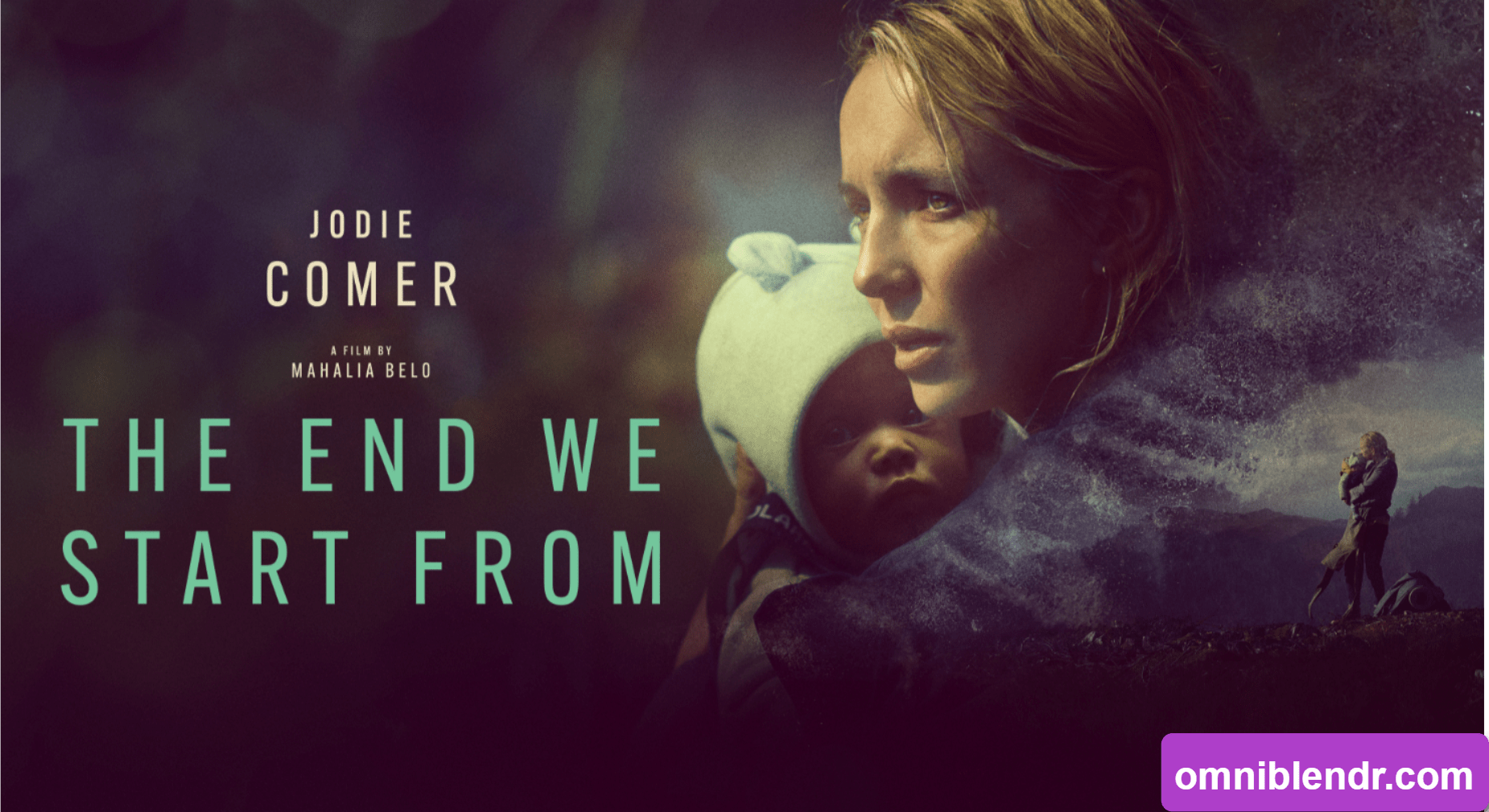In The End We Start From, experiencing motherhood for the first time is as transformative as surviving a climate disaster. The End We Start From is a film that masterfully intertwines the themes of survival and motherhood.
Adapted from Megan Hunter’s novel, Jodie Comer’s new film redefines the disaster-movie genre by emphasizing intimate moments over action-packed sequences and stark imagery. This approach makes Mahalia Belo’s directorial debut even more authentic — a grounded take on an apocalyptic event where motherhood becomes the ultimate adventure. Jodie Comer’s performance in The End We Start From is nothing short of extraordinary, highlighting her versatility as an actress.
Moreover, who needs large-scale destruction when Comer’s lead performance is so mesmerizing? After being underappreciated in Ridley Scott’s The Last Duel, the Liverpool actress excels in her first solo lead role.
The story follows an unnamed Woman (Comer) who gives birth to her first child, Zeb, just as torrential rain begins to flood London. Together with her husband (Joel Fry), she is forced to flee the city in search of safety.
They find temporary refuge with his parents (Mark Strong and Nina Sosanya) in the countryside. However, the scarcity of resources and rising tensions in increasingly isolated and starving communities shatter any sense of security they had.
Back in the wild, she is alone with her son, navigating loss and trauma while caring for a newborn. It’s a tale of resilience, strength, and chosen families, as another solitary young mother (Katherine Waterston) becomes her companion, transforming the narrative from a grim drama to an inspiring road movie.
Ultimately, The End We Start From stands out from other apocalyptic films by refusing to succumb to pessimism.
The film is anchored in the idea of a life-affirming transformation, with water serving as a crucial element of that process.
Water is a recurring motif — the story begins with a shot from inside a filling bathtub foreshadowing the flood, labour starts with the Woman’s water breaking, rain accompanies her journey, and a significant emotional scene takes place on a beach. The End We Start From offers a refreshing take on the disaster genre by focusing on intimate human moments rather than large-scale destruction.
In the film, water is transformative, capable of both purifying and destroying, leaving ruins in its wake for new life to emerge.
This duality is central to the movie, where Earth’s beauty is highlighted in peaceful moments while relentless weather wreaks havoc. It’s a subtle commentary on humanity’s impact, conveyed without scientific explanations, TV news reports, or overt speeches about climate change.
The film maintains its ecological consciousness while focusing on the Woman’s journey.
With the camera closely following her every move, she becomes a moral compass, continually redefining the ethics of survival.
The characters are unnamed, except for the baby, perhaps to signify that identity becomes irrelevant in the end times. What matters is the new person you become to survive. The baby’s name underscores the film’s hopeful message about the future generation.
Hope is a constant in The End We Start From. The horrors are present but softened by focusing on humanity’s positive aspects, the kindness of strangers, the courage of bringing new life into a decaying world, and the belief that love will prevail.
This hope is encapsulated in a scene where the two mothers meet a stranger (Benedict Cumberbatch, also a producer) and share a cathartic night together, filled with drinking, dancing, and laughter, providing true relief.
Moments when Waterston and Comer find joy in music, singing hits from Grease and Dirty Dancing, illustrate the film’s understanding that uncertainty needs a balance of worry and joy.
The End We Start From: Embracing Hope in the Face of Adversity
This optimistic approach is refreshing, even though it slows the movie’s pacing in the second half and leads to a somewhat rushed conclusion aiming for a happy ending.
Nonetheless, the film is beautifully shot, skillfully adapted by Alice Birch (Lady Macbeth, The Wonder), and brilliantly acted by Jodie Comer, who bears the film’s emotional weight as expertly as her character carries her baby across England.
In a post-COVID world, The End We Start From feels like a tangible possibility, unlike other high-stakes disaster movies such as The Day After Tomorrow or Children of Men. It’s a scenario that feels within reach.
Fortunately, Belo, Birch, and Comer choose to find light in the darkness, emphasizing why life is worth fighting for.
